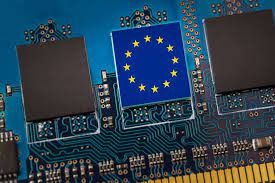The European Union has agreed to a landmark plan to boost its chip industry.
The initiative, dubbed the European Chips Act, seeks to help the bloc compete with the USA and Asia on technology, and secure control over a critical bit of technology behind the world’s electronics products and devices.
The EU Parliament and 27 member states reached a deal on the legislation recently. In a statement, they said the new rules would aim to double the EU’s global market share in semiconductors from 10% to 20% by 2030.
Ebba Busch, the Swedish energy minister, said, “This agreement is of utmost importance for the green and digital transition while securing the EU’s resilience in turbulent times. The new rules represent a real revolution for Europe in the key sector of semiconductors.”
The European Chips Act is a massive, 43-billion-euro (approximately $47 billion) package of public and private investments that aim to secure its supply chains, avert shortages of semiconductors in the future, and promote investment into the industry.
The Chips Act has three main aims:
- Building large-scale capacity and innovation.
- Make sure the EU is self-sufficient.
- Prepare the EU for potential future supply crises.
The European Commission, the EU’s executive arm, stated, “The EU Chips Act will invest 6.2 billion euros to promote industrialization of innovative technologies, establish competence centers for skill development, and ensure access to finance.”
The Chips Act will also reward investments in manufacturing facilities and provide a framework for integrated production facilities and open EU foundries for the security of supply.
The commission said, “Member states will also coordinate to monitor supply and forecast any shortages.”
Since first announcing the plan last year, the EU has already attracted between 90 billion and 100 billion euros of public and private commitments for industrial deployment.
Europe has been seeking to control more of its supply chain to reduce its reliance on foreign market players. The move is part of a push from the EU to achieve digital sovereignty, which refers to the idea that they have more control over critical technologies.
Busch said, “A swift implementation of today’s agreement will transform; our dependency on market leadership; our vulnerability into sovereignty; our expenditure on investment. The Chips Act puts Europe in the first line of cutting-edge technologies which are essential for our green and digital transitions.”
The EU wants to attract funding from foreign companies into its market. Officials want more semiconductors to be developed within Europe, so they don’t face the risk of a big shortage or threats to national security.





